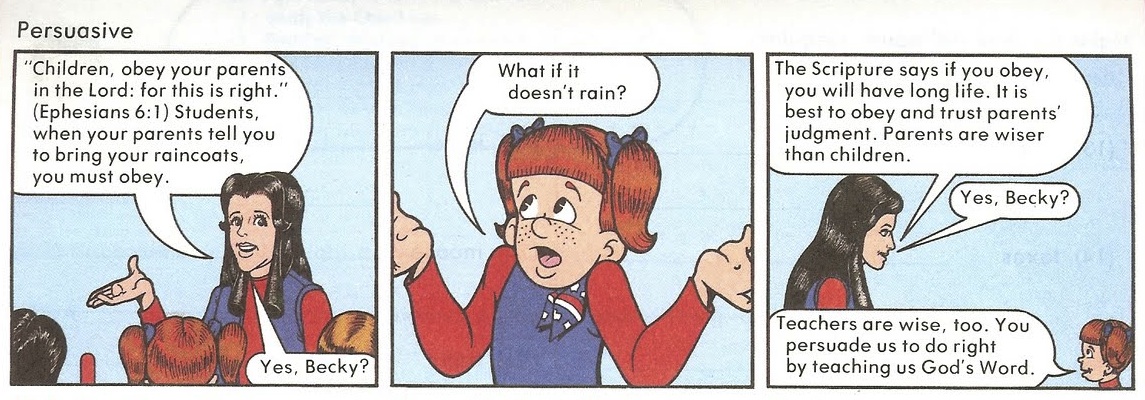The Home Schoolers
Majority of the Solid Rock Baptist Church parents has been educating their children at home since Solid Rock Baptist Church started.
This approach is becoming increasingly popular, but it is so unique that many people have questions about it. To help answer these questions, we would like to list some of the many advantages we have found in home schooling. This list is based on our own experience, but many other homeschoolers would confirm what we say.
Please remember that home schooling is not an automatic cure-all. It takes much hard work to do it right, and no parents should begin unless they intend to do the job diligently. The decision whether or not to home school should be preceded by much careful thought, prayer, and planning. Many good books are available to help parents understand what is really involved.
Students working on their PACEs at the church.
These are some advantages that we have found in home schooling.
#1. Freedom to study the Bible, pray, and teach moral and spiritual truth.
In public schools, teachers may advocate evolution, abortion, homosexuality, women’s liberation, premarital sex, situation ethics, values clarification, the occult, etc. Prayer and presentation of Biblical and religious truth are essentially banned.
In home schools, teachers are free to teach respect for the Bible and for God, with absolute values of right and wrong. Religion and the Bible can be freely discussed and practiced in any subject at any time.
#2. Teachers who are Christians.
Home-schooled children are not confronted with teachers who disbelieve God or the Bible, or who set an example of immoral speech or conduct. Instead, children have teachers who respect the Bible and set a good moral and spiritual example (Prov. 22:6).
#3. Better textbooks.
Public school texts may advocate all the humanistic false doctrines we have mentioned. They never advocate or defend Biblical teaching, respect for God, etc., because such has been banned. In home schools, excellent texts are available that advocate pure values. History and science are approached from Biblical viewpoints. Literature assignments reinforce true morality, without violence, profanity, and other forms of immorality.
#4. Better academic education.
Reports have abundantly documented that students often graduate from public schools even though they have little skill in reading, writing, and arithmetic. In home schools, parents work directly with their own children. They see immediately if the child is not learning well, so they can take action to solve the problem. Personal interaction with the teacher develops the students’ ability to reason and communicate.
#5. Individualized teaching and personal attention.
Instead of dealing with a class of 15-25 students, home-school teachers are dealing directly with each student. This is the best teaching arrangement ever used. The pace can be adapted to the needs of the student. Slow learners can be led at their own pace. Gifted students can be advanced and challenged.
In a classroom, each child has little access to the teacher’s time. Home schools have much more interaction between parents and students. Problems can readily be perceived and dealt with. If the child has a question or needs attention, the teacher is more easily available. Learning is more from person to person and less from books and machines.
#6. More effective use of time.
In classrooms, students often sit idly while the teacher helps other students. Though a student understands certain material, he must still wait while it is repeated for other students. Students do “busy work” (watch TV, etc.) while the teacher is occupied. Worse yet, teachers waste class time on values clarification, psychological probing, sex education, and other objectionable programs.
In the home school, the teacher works directly with each student, progressing when the child is ready. Many students learn more in 2-5 hours daily than do other students who are gone from home 8-10 hours and then come home to several hours of homework!
#7. More flexible use of time.
We believe home schools need a planned schedule. However, parents can still feel free to fit in special learning opportunities that fixed classroom hours may not allow. Students can take special field trips, attend interesting events, or visit with informative people. Families can plan vacations during the off- season while other kids must be at classes. Often some of our children go with me when I preach in gospel meetings.
#8. Better discipline.
Unfortunately, public schools exercise little discipline. As a result, many students become involved in violence and crime. Even students from good homes may become undisciplined or are mistreated by other students. In home schools, families are free to exercise the discipline parents believe is best, guided by God’s word.
#9. Greater expression of patriotism.
Though run by the government, most public schools express little appreciation or allegiance for our country. Sometimes patriotism is actually discouraged and our form of government is undermined. In home schools, parents are free to point out the blessings, freedoms, and achievements of America, as well as the weaknesses.
#10. Strong family ties.
When children are at school 9-10 hours a day (not counting extra-curricular activities), family ties are weakened, especially if family values are contradicted by teachers or students. Home-schooled children spend much more time with their families. This naturally strengthens family ties.
Families study, work, play, and pray together. Children learn to love and appreciate parents, brothers, and sisters. They can enjoy children of various ages. All family members become much closer to one another. For our family, this has been one of the best bonuses of home schooling.
#11. Better control of peer influences.
One of the biggest problems in public schools is the bad influence students have on one another. Kids lie, cheat, steal, disrespect authority, or use drugs, bad language, or immodest dress. Even good students are forced to be around kids who act this way. Home-schooled kids associate with the children that their family chooses for them to associate with. This weakens the harmful influence of “bad crowds.”
#12. Independent thinking and better social adjustment.
Some people think that kids in home schools are too isolated socially. However, by avoiding peer pressures, home-schooled students learn to develop naturally in the environment God gave kids — the family. Remember, the school is the human innovation; the family was designed by God.
Home-schooled children learn to think independently from their peers. They learn to invent ways to entertain themselves. Because they associate with adults and with kids of other ages continually, they learn to get along with people of all ages, not just people their own age. This generally makes them social leaders.
#13. Better health.
Home-schooled children do not bring home all the illnesses being passed around at school.
#14. Teachers who know and understand each student better.
Parents have lived with each of their children since he/she was born. Who could better know their individual strengths and weaknesses? A classroom teacher may take months to get to know the children well. Then, at the end of the year, the students move on to another teacher.
#15. Better self image.
All the advantages we have listed tend to produce children with a high sense of self-esteem. The child does not face rejection and mockery from other kids if he is a slow learner, a gifted learner, too tall, too short, has different religious views, or is otherwise unusual. His parents want to help him overcome any problems he has. They have no desire to hurt his feelings or make fun of him. He will gain confidence because of his greater academic achievements. And above all, the faith he develops in God will show him his true worth.
#16. Highly motivated teachers.
Who has more reason to care for the child and to encourage his success than do his own parents? Class teachers, frankly, may be motivated by money or other desires. But no one has as much reason to seek the child’s welfare as his parents.
#17. Better opportunities for church involvement, jobs, and community service.
Public school schedules often conflict with church activities or hinder involvement in jobs or community service. Home schoolers are free to arrange their schedules according to their own priorities.
#18. Better attitudes toward authority.
Children in home schools are much more likely to develop respect for their parents and therefore respect for all authority figures, including God. Students in classes often form their strongest ties with their peers, but home- schooled kids develop strong ties to parents so they learn to relate well with authority.
#19. Better preparation for life.
Many people think that home schoolers are so isolated that they cannot adjust to “the real world,” but just the opposite is true. Consideration of all the points we have already listed ought to show many ways that home schoolers are better prepared for life than are other students.
What is it that we want children to become in “real life” — faithful Christian adults, right? Is this most likely to occur when we put them in an environment consisting almost entirely of people who are neither Christians nor adults — when they associate mostly with other children, nearly all of whom are not Christians? Children are imitators. If we want them to grow up to be faithful Christian adults, doesn’t it make sense for them to spend more of their time associating with faithful Christian adults (their parents) so they can learn to imitate their example?
#20. The parents are really in charge of the child’s education.
You, not the government, are the ones God put in charge of your child’s training (Eph. 6:4; Prov. 22:6). Home schoolers have the ideal situation for giving the education they believe is best for their children. Eliminated are all the continual doubts, problems, and conflicts with teachers, administrators, school policies, etc. As a result, the whole family feels good about how the child is being educated.
~~~~~~~~~~~~~~~~~~~~~~~~~~~~~~~~~~
This material is from the booklet “Introduction to Home Schooling.

PACEs have cartoons like this on most pages. Sometimes they are used to teach academic rules. Other times, as here, they teach how Godly children must behave.

